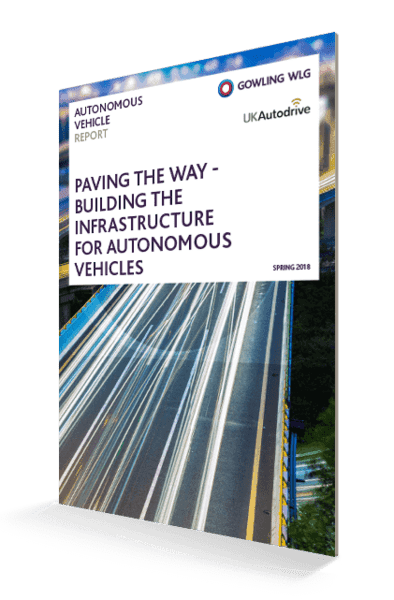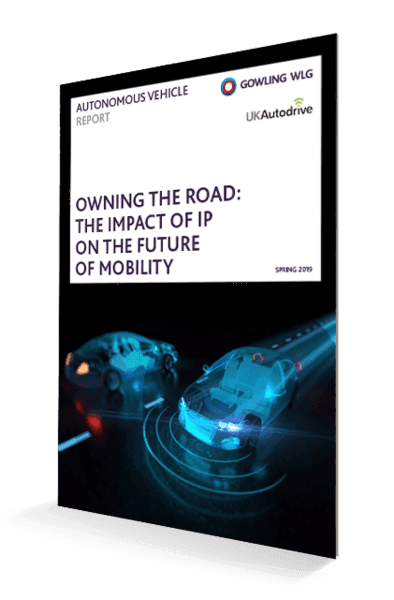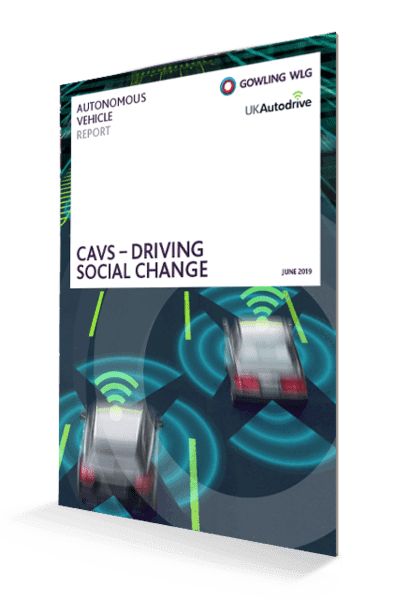Our first white paper looks at the importance of data protection.
Is the industry being helped or hindered by data protection regulation? And how will the General Data Protection Regulation influence the sector's progress?
Are you data driven?
Developments in the Autonomous Vehicles (AVS) market are accelerating at a rapid rate
Most of the world's biggest carmakers and technology giants have announced plans to bring Connected and Autonomous Vehicles (CAVs) to market, some as soon as 2021, and it's predicted that the industry could be worth $7 trillion by 2050.
The UK is set to become a global hub for the development of CAV technologies, with three key consortia championing the UK as a leader in this market.
Gowling WLG is the only law firm to have been part of UK Autodrive, the largest consortia trialling automated vehicle technology as part of a government-backed initiative to support the introduction of self-driving vehicles into the UK.
In May 2019, the UK Autodrive Consortium published its Final Project Report, following the successful conclusion of the project in late 2018 with the world's first multi-modal journey featuring connected and autonomous road- and pavement-based vehicles.
An integral part of the UK Autodrive consortia, Gowling WLG continues to drive the conversation on Connected and Autonomous Vehicle development to ensure the future and sustained success of self-driving vehicles in the UK.
Our latest white paper, entitled 'Future supply: what will CAVs mean for the automotive supply chain?', explores how the advent of CAVs might change the established automotive supply chains that Original Equipment Manufacturers (OEMs) rely on to make their businesses work in the wake of expensive, complex and, in some cases, technologically risky changes for a transforming sector.
We are contributing to the thinking on societal and legal issues around the development of autonomous vehicles by developing a series of white papers.
As part of the series, we ask questions like...What are the data protection risks when it comes to driverless vehicles? Is there enough regulation around the moral algorithms of driverless vehicles? Is it possible, or even feasible, to make these new vehicles cyber resilient? How can public and private sector firms create effective road transport networks to allow CAVs to fulfil their potential? and What are the potential social impacts of automation, and how and when do local and national government policies need to change to maximise the social benefits of Connected Autonomous Vehicles (CAVs)?
The first six reports cover data protection, the moral algorithm and the cyber security of driverless vehicles, the challenges of reshaping our infrastructure in preparation for CAVs, the impact of intellectual property rights on future mobility and CAV development, the social impacts of automation, and our latest paper discusses the impact of CAVs on the automotive supply chain.
Our first white paper looks at the importance of data protection.
Is the industry being helped or hindered by data protection regulation? And how will the General Data Protection Regulation influence the sector's progress?
Are you data driven?
Our second white paper discusses how AVs perform in 'moral dilemmas'.
How will a driverless vehicle make a decision when posed with a dangerous situation, and how will this programming be regulated?
Download 'The moral algorithm'
Our third white paper looks at cyber security in connected and autonomous vehicles.
The paper asks whether there is enough collaboration among the manufacturers to share information and adopt best practice procedures when it comes to the cyber security of these vehicles.
Download 'CAVs: A hacker's delight?'
What challenges lie ahead in creating an effective road transport network which will allow CAVs to work to their full potential?
Download 'Paving the way'
How are intellectual property (IP) protection and enforcement strategies affecting the automotive industry of the future?
Download 'Owning the road'
What are the potential social impacts of automation, and how and when do local and national government policies need to change to maximise the social benefits of Connected Autonomous Vehicles (CAVs)?
Download 'Driving social change'
What will CAVs mean for the automotive supply chain? Download the 'Future supply' report.
Download report
